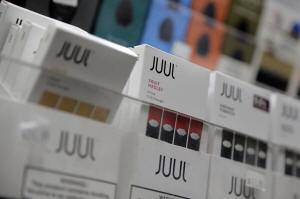Juul gets FDA's OK to keep selling tobacco and menthol e-cigarettes
[July 18, 2025]
By MATTHEW PERRONE
WASHINGTON (AP) — The Food and Drug Administration is allowing vaping
brand Juul to keep its e-cigarettes on the market, providing relief to a
company that has struggled for years after being widely blamed for
sparking the teen vaping trend.
FDA regulators said Thursday that Juul's studies show its e-cigarettes
are less harmful for adult smokers, who can benefit from switching
completely to vaping.
The FDA decision applies to both tobacco- and menthol-flavored versions
of the reusable product, which works with nicotine-filled cartridges
sold in two different strengths. Juul previously discontinued several
fruit and candy flavors that helped drive its popularity but were
favored by teens.
Juul will be one of only two U.S. companies authorized to sell
menthol-flavored vapes, which many adults prefer to tobacco flavor.
“This is an important milestone for the company and I think we made a
scientifically sound case for the role that menthol can play in
e-vapor,” Juul CEO K.C. Crosthwaite told The Associated Press.
Parents, politicians and anti-tobacco groups are certain to oppose FDA’s
decision. They have argued for years that Juul products should be
permanently banned due to their role in triggering a yearslong spike in
underage vaping.

"It is a big step in the wrong direction to authorize sales of the
product that was responsible for this public health crisis in the first
place," said Yolonda Richardson, CEO of the Campaign for Tobacco-Free
Kids in a statement.
Juul was once valued at over $13 billion and its small, sleek
e-cigarettes revolutionized the image and technology of the vaping
industry. But the company has since been forced to slash hundreds of
jobs and pay billions to settle lawsuits over its role in the rise of
youth vaping.
The FDA had ordered the company to remove its products from the market
in June 2022. But then the agency abruptly reversed course days later
and agreed to reopen its scientific review of Juul’s application after
the company pushed back in court.
Juul said that regulators had overlooked thousands of pages of
scientific data critical to its submission.
Thursday’s announcement is not an approval or endorsement, and the FDA
reiterated that people who do not smoke should not use Juul or any other
e-cigarettes. The FDA determination indicates that smokers who switch
completely to Juul can reduce their exposure to deadly carcinogens and
other chemicals found in traditional cigarettes.
The FDA decision applies to Juul's original system, which is now roughly
a decade old. Crosthwaite said the company hopes to win authorization
for its next-generation device and is also considering applying to FDA
for more flavors.
“It's critically important that American adults who use tobacco have
regulated options,” Crosthwaite said.
[to top of second column]
|

Juul products are displayed at a smoke shop in New York, on Dec. 20,
2018. (AP Photo/Seth Wenig, File)
 In recent years, the FDA has
authorized a handful of e-cigarettes to help adult smokers cut back
on cigarettes. Juul's main competitors, Vuse and Njoy, each
previously received FDA permission to remain on the market. Njoy
sells the only other menthol-flavored e-cigarettes authorized by
FDA.
To meet FDA requirements, companies must show that their products
benefit public health. In practice, that means proving that adult
smokers who use them are likely to quit or reduce their smoking,
while teens are unlikely to get hooked on them.
The brainchild of two Stanford University students, Juul launched in
2015 and within two years rocketed to the top of the vaping market.
Juul quickly outpaced older brands with its high-nicotine,
fruity-flavored cartridges, sold in mango, mint and creme brulé. The
company's small, discrete devices provided a more potent,
user-friendly alternative to older, bulkier devices.
But the company’s rise was fueled by underage use, and e-cigarettes
quickly became ubiquitous in U.S. schools. In 2019, the company was
pressured into halting all advertising and eliminating most of its
flavors, leaving only tobacco and menthol-flavored options.
By then the company was already the target of multiple
investigations and lawsuits by federal, state and local officials as
well as class action attorneys.
In 2022, the company paid $1.7 billion to settle thousands of
lawsuits brought by families of Juul users, school districts, city
governments and Native American tribes. The company separately
agreed to pay $1.1 billion to settle lawsuits or investigations from
most U.S. states.
Juul is no longer the top-selling e-cigarette brand and now trails
Vuse, which is sold by tobacco giant Reynolds American, which also
makes Camel and Newport cigarettes.

Teens have shifted away from Juul amid a wider drop in vaping,
according to the latest federal figures. The FDA reported last year
that teen vaping dropped to a 10-year low, after stepped up
enforcement against unauthorized brands imported from China, such as
Elf Bar.
Unlike Juul, disposable e-cigarettes like Elf Bar still come in
fruit and candy flavors, despite efforts by regulators to block
their use.
All contents © copyright 2025 Associated Press. All rights reserved |